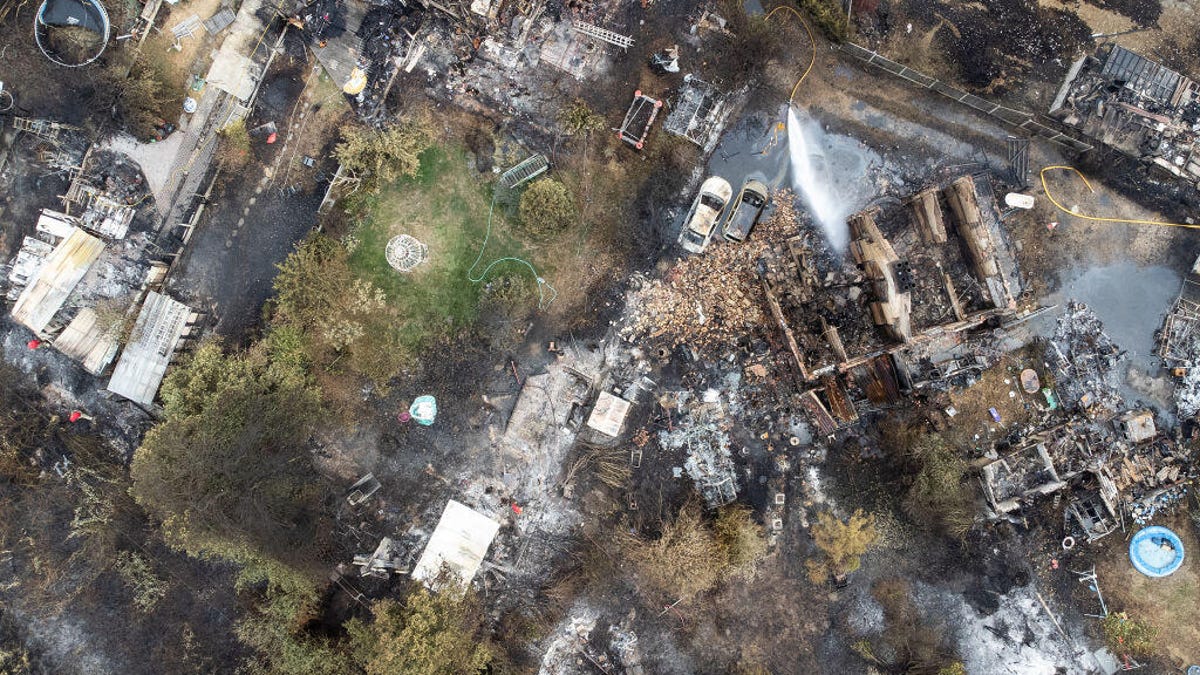Europe's Devastating Heat Wave Shows Keeping Calm and Carrying On Is Not an Option
Commentary: Every moment we waste on muddling through rather than aggressively following the science is a moment we lose to slow the escalating climate crisis.

England's not so green and pleasant land.
As I flew into London City airport on Tuesday evening, a thickly veiled sunset gave the gunmetal sky a faintly nuclear glow. Far below, the burning fires left dusty streaks across the landscape. The flash of the fire-engine lights and clusters of flames were visible even from hundreds of feet in the air.
If it sounds apocalyptic, that's because it was.
It was the hottest day on record in the UK, with temperatures topping out at 40.3 degrees Celsius (104.5 degrees Fahrenheit) -- a situation forecasters had predicted might be a "worst case scenario" that we wouldn't have to deal with until 2050. London's fire brigade had its busiest day since the Second World War. The heat wave engulfed Europe, bringing to the continent the extreme weather that's been afflicting countries in Asia and Africa for many years.
Climate scientists and meteorologists were unequivocal in their analysis of the heat wave. It is one of the many weather events we've seen around the world over the past few years to be greatly exacerbated by human-induced climate change, which is largely caused by the burning of fossil fuels for energy.
But even as Europe burned, those people who deny scientific facts set to work promoting a false counter-narrative attempting to normalize the statistically abnormal temperatures. Some insisted they were no different to the hot days they experience on vacation in destinations many latitudes south of the UK, and packed their followers off to make the most of the beach day. Meanwhile, just across the English Channel in France, tens of thousands of people were being evacuated from coastal areas.
Others resorted to discrediting and insulting the scientists and activists sounding the alarm. One Conservative politician openly called those linking the heat to the climate crisis "cowards" and "snowflakes." The right-wing Daily Mail's Dan Wootton dismissed Chloe Brimicombe, an award-winning 25-year-old climate scientist who was called on to speak to media because of her expertise in heat wave research, as "barely out of nappies." If you reacted to the news with shock and concern, one critic, a TV psychologist, called you "embarrassing."
All these reactions are examples of the distinct brand of British conservatism that prides itself on its ability to keep a stiff upper lip and hold it together through any crisis. "Keep calm and carry on," the popular saying goes, reminding Brits that cultural norms require them to repress anything resembling an emotion, and instead bottle it up to pass on to their children as generational trauma. What might seem like a plea for resilience is in fact a demand that we maintain the status quo at all costs.
In this environment, anyone who attempts to raise the alarm or express any kind of heightened emotion in reaction to a particular situation is easily painted as a hysterical radical, intent on introducing unnecessary drama and upset into people's daily lives.
But it's definitely time to get radical in our thinking.
According to a report from Yale last month, much of the UK believes climate change is real and that it's caused by humans. But in this environment, it's far from surprising that a chunk of the British media and population's response to the climate crisis -- as it was for COVID and for Brexit -- is that we'll muddle through it just as we always do. But that isn't going to cut it anymore. Every moment we waste on muddling rather than aggressively following the recommendations of science is a moment we lose to slow an escalating problem.
As climate activist Greta Thunberg tweeted this week, temperatures of 40-plus degrees aren't the new normal, because temperatures are going to continue to rise everywhere.
It's easy to empathize with those who feel the climate crisis is simply too big and frightening to engage with. But those who blindly deny the science, which is definitive, while playing Pied Piper are encouraging people to sleepwalk their way into a living nightmare. Mocking those dedicating their lives to pursuing the scientific truth or the necessary system change that accompanies it won't alter facts.
"Unlike other weather hazards (drought, flooding, storms, wildfires) heat waves do and can occur anywhere across our world," Brimicombe told me over email. "Climate change is increasing the frequency, intensity and duration of heat waves and this means they have greater impacts. They are also the deadliest weather hazard."
Brimicombe and her fellow scientists aren't going for the clicks or the clout when they tell you people are dying. (That's among the least effective tactics for scoring either of those things.) They're asking for your solidarity, your vote and at the very least your willingness to believe that what science is telling us is true.
And they're asking for this in the hope that future generations may know the pleasures of a balmy beach day rather than unbearably blistering summers just like the one we had a taste of this week.

